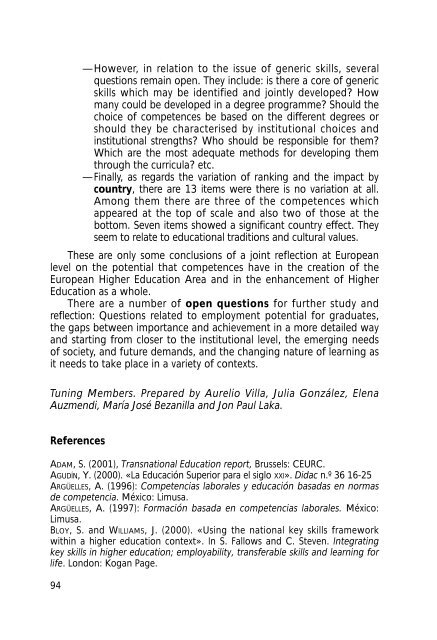Final Report Pilot Project - Relaciones Internacionales de la ...
Final Report Pilot Project - Relaciones Internacionales de la ...
Final Report Pilot Project - Relaciones Internacionales de la ...
You also want an ePaper? Increase the reach of your titles
YUMPU automatically turns print PDFs into web optimized ePapers that Google loves.
—However, in re<strong>la</strong>tion to the issue of generic skills, several<br />
questions remain open. They inclu<strong>de</strong>: is there a core of generic<br />
skills which may be i<strong>de</strong>ntified and jointly <strong>de</strong>veloped? How<br />
many could be <strong>de</strong>veloped in a <strong>de</strong>gree programme? Should the<br />
choice of competences be based on the different <strong>de</strong>grees or<br />
should they be characterised by institutional choices and<br />
institutional strengths? Who should be responsible for them?<br />
Which are the most a<strong>de</strong>quate methods for <strong>de</strong>veloping them<br />
through the curricu<strong>la</strong>? etc.<br />
—<strong>Final</strong>ly, as regards the variation of ranking and the impact by<br />
country, there are 13 items were there is no variation at all.<br />
Among them there are three of the competences which<br />
appeared at the top of scale and also two of those at the<br />
bottom. Seven items showed a significant country effect. They<br />
seem to re<strong>la</strong>te to educational traditions and cultural values.<br />
These are only some conclusions of a joint reflection at European<br />
level on the potential that competences have in the creation of the<br />
European Higher Education Area and in the enhancement of Higher<br />
Education as a whole.<br />
There are a number of open questions for further study and<br />
reflection: Questions re<strong>la</strong>ted to employment potential for graduates,<br />
the gaps between importance and achievement in a more <strong>de</strong>tailed way<br />
and starting from closer to the institutional level, the emerging needs<br />
of society, and future <strong>de</strong>mands, and the changing nature of learning as<br />
it needs to take p<strong>la</strong>ce in a variety of contexts.<br />
Tuning Members. Prepared by Aurelio Vil<strong>la</strong>, Julia González, Elena<br />
Auzmendi, María José Bezanil<strong>la</strong> and Jon Paul Laka.<br />
References<br />
ADAM, S. (2001), Transnational Education report, Brussels: CEURC.<br />
AGUDÍN, Y. (2000). «La Educación Superior para el siglo XXI». Didac n.º 36 16-25<br />
ARGÜELLES, A. (1996): Competencias <strong>la</strong>borales y educación basadas en normas<br />
<strong>de</strong> competencia. México: Limusa.<br />
ARGÜELLES, A. (1997): Formación basada en competencias <strong>la</strong>borales. México:<br />
Limusa.<br />
BLOY, S. and WILLIAMS, J. (2000). «Using the national key skills framework<br />
within a higher education context». In S. Fallows and C. Steven. Integrating<br />
key skills in higher education; employability, transferable skills and learning for<br />
life. London: Kogan Page.<br />
94


